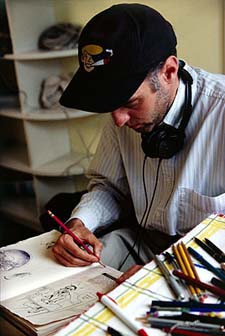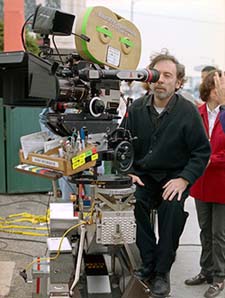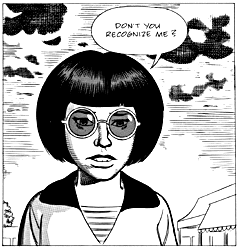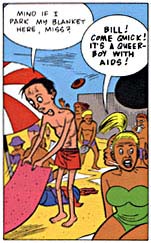|
Gadfly: Why was Ghost
World the project that drew you into Hollywood?
Daniel Clowes: It was more
that it interested the people I wanted to work with—who
were Terry Zwigoff and this person Lianne Halfon [producer
of Ghost World and Crumb]. They both thought
those characters could work well in a movie. That was
the first time that anyone I had real respect for approached
me about working on something with me.
What had people
approached you to do before?
Mostly it was independent
guys who didn’t have any money. They would want to
do something where I do all the creative work and they
take credit for it. It made me really uncomfortable when
they were pitching to me. They would say stuff like, "You
have all these great ideas. If you could come up with
a bunch of ideas, then I will direct it and put my name
on it." A lot of graduate students, guys who are just
out of film school and are looking for something they
could afford. But luckily, I didn’t get involved
with them. I waited this long, and look what happened.
I got involved with a few things early on, little film
school projects. I did them because I thought they would
be a funny thing to show at a party. The minute they made
the thing, the filmmakers would want to send it out to
festivals. And you’re attached to these people.
What was it like
pitching Ghost World? Explain to me one pitch meeting—did
you psychically kill one studio executive’s fish
with your mind?
That did happen, yeah.
It was a meeting that we shouldn’t have gone to.
It was one of those things where somebody calls you down
to Hollywood for a meeting, and you go because it’s
a free trip and you don’t know what they want. Within
five minutes, we knew we didn’t want anything to
do with him. He wanted to do some TV show, and they didn’t
even know what they wanted. And they wanted us because
we were edgy or something. We were just in the worst mood
and were trying not to look at each other because we knew
we would start laughing like in fifth grade when the idiot
teacher is looking at you. There was this oppressive bad
mood emanating from us. Then, as we left, the guy says,
"Hey, my fish just died." It was truly like the psychic
energy destroyed this thing.
You and Terry
Zwigoff were planning on making Ghost World with
Christina Ricci. Did you and Zwigoff see American Beauty
and start thinking about Thora Birch instead?
Well, Christina was attached
right after The Ice Storm. She was 18-years-old
and I was very adamant that the girls in this film be
18-years-old or less. We could never get the right amount
of money to make the film the way we wanted to. It kept
dragging on, and then Christina was 21, 22 years old.
She just didn’t seem right anymore; she seemed like
she was an adult actress and not a teenager anymore. Then
we saw Thora. We were so happy that we had waited because
she was the perfect Enid at the perfect time. I think
Christina could have been great as well. Even Christina
was somewhat well-known and might have shaded the character
somewhat, while Thora is a bit of a blank slate.
Thora Birch had
mentioned that she had hung out with you to get a feel
of the character of Enid. What did you do?
I was there the whole time
in pre-production and on the set. I think she learned
how to play Enid from observing me and Terry and how we
acted.
That’s interesting
because neither one of you is an 18-year-old girl.
I think
she adapted our world-weary sensibility into an 18-year-old
girl. I think that’s what the character of Enid is,
in some ways. I also think the way that Steve Buscemi
played the character of Seymour was not at all from what
Terry told him to do but instead from watching how Terry
walked around the set.
Would the story
of Ghost World be much different if it was two
teenage boys?
Yeah, very much so. Boys
are just very different at that age. They’re not
as developed; it wouldn’t have been believable. It
would almost only work if it was two men—one 53 [Zwigoff]
and the other 40 [Clowes].
With the character
of Enid, both in the film and the book, isn’t not
wanting to conform a form of conforming?
That’s a reductive
or at least the easy sound bite way to characterize Enid.
She doesn’t know what she wants. She’d be happy
to conform to something that she liked. But she has a
sense that there is a better way to live than what she
sees. But she doesn’t know where it is.
In the
Ghost World comic book, Enid makes a harsh criticism
of Sassy magazine. It turns out that they had wronged
you—what happened between you and Sassy magazine?
They had always been really
nice to me. If they wrote reviews of other comics, they
always mentioned stuff and me like that. Then one day,
my wife brought home an issue that had a big illustration
by me just taken from one of my books without anyone ever
asking me. I figured that I would be really cool about
this and instead of screaming and yelling I would just
send them a bill for a low amount. I wrote them a letter
saying, "You forgot to inform me that you were going to
use this, so here is my bill for this illustration." Then
they completely ignored me. Then I started writing slightly
angrier letters, asking them to please pay me for this.
They had all these excuses for why it ran, but nobody
was paying me or really doing anything about it. Then
they became my mortal enemy after that. [laughs]
I never pictured
Sassy having such vengeance and anger.
It was just really annoying.
It’s a really obnoxious thing to do, and I could
sue them for all kinds of money. And instead I was being
nice about it. I’m sure it was some intern that I
dealt with the whole time, anyway.
How did John Malkovich
end up producing Ghost World?
Originally and throughout
the entire film, we were working with Terry Zwigoff’s
longtime producer, Lianne Halfon. Without ever mentioning
it to Terry or me, she was very close friends with John
Malkovich and had produced his stage play of Libra,
based on the Don DeLillo book, in Chicago. So Malkovich
wanted to start a film production company [which eventually
became Mr. Mudd]. The first person he thought of to hire
was Lianne. This was right in the midst of us packaging
Ghost World; his company then became the production
company. He was not really present during the making of
the film. He was very supportive of the film and was also
helpful in making phone calls when we needed him. He’s
a genuinely good guy, which you wouldn’t expect from
a big celebrity like that.
I know that you
created your book, David Boring, while working
on Ghost World. Did the making of Ghost World
influence you while creating David Boring?
Yeah, not necessarily making
the film but writing the script and trying to get the
film made. David Boring is very much about frustration
and that’s what was going on in my life trying to
get the movie made.
David
Boring was very different from what you have done
before. To me, it was as depressing as Chris Ware’s
Jimmy Corrigan.
[laughs] It was a grim
summer when those two books came out.
And the book companies
promote them like any other book. I wonder if they even
read them.
I wonder that sometimes
myself.
You said that
the book came out of frustrations. So, does that feeling
go away once you finish the book?
It’s hard to say.
It does to some degree. But the underlying problems that
made you write these books never go away. There’s
always something new to take their place.
Probably one of
the first things I read of yours was PUSSEY! [which
collected every story starring the nerdish comic book
artist/superstar from the 15 issues of Eightball].
Are you amazed by how much of that book has come true?
I was telling my publisher
that I wanted to take that book out of print because it’s
so mild compared to the reality of the situation. At the
time I did it, it was supposed to be a caricature of the
business. Now there are so many more stories that are
so much worse that I hear on a daily basis about the comic
book business. It just seems pointless to have that book
in print.
Well, except for
how the older were treated, I thought it was somewhat
mild but totally true.
At the time, everybody
thought I was the meanest guy in the world for doing that
stuff. Industry people were calling me a total asshole.
Now I’m sure they would be flattered by it. Pussey!
came out of when I first started doing comic books; I
really tried to understand the comic book business and
go to conventions. I used to feel so alienated because
I would be stuck in between two Dan Pussey types. I hated
the business I was in. It came out of the anger at that,
and then after a while I stopped dealing with that whole
part of the comic book world. My anger really dissipated,
and now I don’t really care; it’s not something
I even think about anymore.
Many creators
such as Mike Allred [Madman, X-Force], while
selling their books through so-called independent companies,
were still much more mainstream than you. Many of them
are moving into mainstream comic books for Marvel and
DC. For example, there was this book called Bizarro
Comics recently released by DC Comics.
I actually did the original
cover for that, which they rejected. They hired Chip Kidd;
he called me to do the cover. I did it, and I thought
it was very funny. The higher-ups at DC did not get the
humor of my cover so they cancelled it. Chip and I both
quit because of that. Then they got Matt Groening’s
assistant to do a cover and sign his name to it, which
is about as alternative as DC gets. But then after I saw
the book, I was so thrilled that I wasn’t associated
with that thing. It had a few stories that were okay;
like that Tony Millionaire story was really nice but boy,
most of it was such crap. I couldn’t imagine that
anyone was buying it. The great news I heard was that
they made the price on the book so low they're actually
losing money on every copy sold.
They were able
to get this banned Superman as a baby story into it. So
that was good.
Yeah, supposedly they are
going to use my cover in their next book. So they will
keep banning something, then reprinting it later.
How did you end
up doing the poster for Todd Solondz’s film, Happiness?
Todd Solondz is a friend
of Terry Zwigoff. When Todd first wrote that script, he
sent a copy to Terry. I read it and loved it. Right after
that, Todd called me up and said he wanted to do a comic
book adaptation of it to promote it. I told him how much
work it would be and how I would never be able to finish
it in time. We decided that wasn’t going to work
out. Three or four months later when the film was coming
out, I got a call from the ad agency and they said they
wanted me to do the poster. I said, "Oh, you must have
talked to Todd." They said they hadn’t; it was just
a coincidence. I think there is something about my work
that lends itself to that film. Also, I couldn’t
imagine anytime in my life spending my time adapting someone
else’s work, whether it’s a film or a novel.
I’m really just interested in doing my own stuff
when it comes to comic books.
I had heard that
you and Zwigoff had some problems with the editing of
Ghost World.
Not really, that’s
something that’s been exaggerated. After the shooting
of the movie, we had three hours of usable footage so
we had to cut it down. I think it’s actually too
long even as it is, by Hollywood standards. We had to
cut an hour's worth of material. Every little thing that’s
cut is painful for both of us. We argued, but I think
we argued less than anyone else would have in that position.
We really got along almost 100 percent.
I think it was
New Yorker magazine where I read that.
That guy really tried to
blow it out of proportion. That was his thesis—that
I was an outsider in this situation—but that it is
not true at all.
 |
|
Dan
Clowes
|
You felt good
about the collaboration?
Yes. If I had done it all
by myself, it would not have been as strong; and if Terry
had done it all by himself, I don’t think it would
have been as strong, either. It’s really good that
we had each other for support.
All of us geeks
were really nervous about the film.
Everybody was, believe
me. There is a lot of pressure when you do something like
that because 99 percent of the time they come out horrible.
You’re obviously
a fan of R. Crumb and Harvey Pekar. I first heard of Zwigoff
when he was running around Pekar’s house. When did
you first hear of Terry Zwigoff?
Well,
I had known about him for years because I had all those
R. Crumb and the Cheap Suit Serenaders records when I
was a teenager. I was like, "Who’s this funny looking
Charlie Chaplin/Albert Einstein-looking guy on the back?"
Crumb always draws Terry in his strips as this kvetching
little hunched-over homunculus figure with no mouth, always
complaining about his back. I felt like I know more about
Terry than I should just from reading those comic books.
I first met him right after he finished Crumb.
He got in contact with me, and we became instant friends.
 |
|
Terry
Zwigoff
|
It’s amazing
that he stuck with the project for so long. Usually filmmakers
do their damnedest to a film about every two, three years
or so.
As someone who intimately
got to see why it took so long, it's like we were working
everyday on this film for years. We’d do something—write
the script or be thinking of new ideas—then all of
sudden five years have gone by.
Was
it less frustrating for you because you were writing and
drawing comic books over that time and plus your books
usually take a long time to do, anyway?
In the time it took to
do the movie, I did three comic books and basically did
the movie as a hobby. With Terry, he was living and breathing
that film everyday—the hell of waiting around for
phone calls when you have nothing else to do.
You’ve said
your childhood was ""perfect if you want your child to
grow up to be a cartoonist."
[laughs] That’s true.
Would you want
the same childhood for your kids?
No, it’s mainly because
I was very isolated and that’s no fun for a kid.
 |
|
Caricature
|
Did growing up
at your grandparents' stir your interest in things retro?
I think to some degree.
They were pretty modern; old people aren’t necessarily
into old stuff. They want all the latest things. I remember
showing my grandmother these neat things I found from
1902. She would say, "Why do you want that old thing?"
That’s the way people who grew up in the Depression
were. They could have all this new shiny, cool stuff.
They don’t want to be old. They want to be young.
I think it was just something ingrained in me. Cartoonists
tend to be nostalgic types; it's part of the personality
makeup. Somebody needs to do a psychological study of
the mind of a cartoonist—because there are all these
common traits, at least all the good ones.
In 1991, Chris
Ware joined you and other artists to create improvisatory
comics. What are those exactly?
They are something that
will never be seen… no, just kidding. We printed
them up actually in the early nineties. It was my best
friend in Chicago, Garry Lieb. We used to meet up in this
coffeehouse every Thursday night. On the back of those
band flyers we would improvise comics, which ended up
being basically pornography. After a while people like
Chris Ware, Terry LaBan, and Archer Prewitt started joining
us. Then it became this really serious thing where we
were all trying really hard. It became not fun at all.
It became drudgery every week to go do this. But we did
several hundred I think. We all have copies. They’re
waiting until only one of us is left before they're printed.
Do you actually
think Frank Miller’s The Dark Knight Returns is
stupid?
I’ve tried to read
it like two or three times, and it's just annoying to
me. I’m not the right audience for it.
Were you ever
much into mainstream comic books?
Not since
Jack Kirby left Marvel for DC, though I still joylessly
bought them until I was fifteen-years-old, just filing
them away and not reading them.
And you also really
dislike Kevin Smith films.
Yeah, I’m not a fan
of his. I just don’t get it. It just seems obnoxious.
I only thought
Chasing Amy was really any good.
I would have to say that
is the only one I have been able to sit all the way through,
and I have never had a more disagreeable film going experience.
I guess that is the least obnoxious movie of his. They
are not for me.
Why was Ghost
World colored in blue hues?
I thought it looked cool.
It was just an experiment. Originally, I thought Ghost
World was going to be only one story. I didn’t
know I would continue it. I didn’t think about it
anymore than that.
I thought
it was funny that it was the book that got so big. You
do so many.
You never know.
Why
did it seem to connect?
Well, I think everyone
in the world was an alienated teenager, whether they admit
it or not. Not everyone was a pimply comic book artist.
The other books don’t have that universal appeal.
Ghost World
seems to have made a lot of money for what it is. Have
you been offered much outside of the work you normally
do?
We’re negotiating
to write another screenplay, which I would write all by
myself. That’s my next thing. I could definitely
get paid a lot of money to do something I didn’t
really want to do, then never work again. But luckily,
I’m old enough to know not to do something like that.
Are you excited
about all the Oscar talk with the film?
To me, it seems so outlandish
to even think about it. But that would be great. I think
it would be great if Thora or Steve got a nomination.
He’s been doing it for so long, and now here’s
a chance to make up for all of that.
Was the role that
Buscemi played going to be either Don Knotts or Steve
Buscemi?
(laughs) We were dying
to get Knotts in the film. But he’s quite old and
almost blind. We kind of felt even bad making him leave
the house to do something. Just let a guy like that rest.
I didn’t want to put him in the film just to do it.
I hate that kind of idea. He’s done enough great
stuff on his own. But that painting of him in the film
is good enough.
Which is harder,
the writing or the drawing? Why?
Well, with the writing
you have to hope it comes or not. Sometimes it is easier,
and sometimes it's not. The drawing is something I’ve
been doing since I was a little kid. The hard part is
knowing what is good and what isn’t. That’s
where the experience comes in.
What’s coming
up for you?
The new issue of Eightball
just came out. It’s the first color comic book I’ve
done and the first self-contained issue of Eightball
ever. I’m starting work on my new screenplay,
which hopefully will be directed by Terry Zwigoff.
 |
|
Eightball
|
How come you’ve
stuck with Fantagraphics for all these years?
Another cartoonist at Fantagraphics
said that their
motto should be, "Fantagraphics, because who else are
you going to go to?" Gary [Groth] and Kim [Thompson] have
been able to find a way to keep their business afloat
for 25 years now, which is pretty amazing. They’re
not great at doing big promotions or anything like that.
They’re basically honest, though they are a little
slow at paying. I trust them, and I know what to expect.
I’ve been with them since 1985. Eightball
is their longest-running title.
Do
you still hate things as deeply as you used to?
Everything I hate now is
different.
|